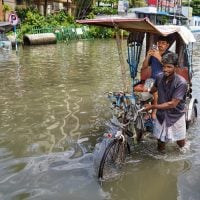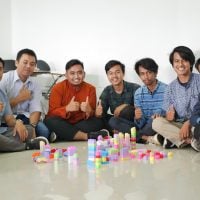Deadline: 16-Apr-24
UNDP with funding from the Governments of Denmark, Norway and Australia are seeking proposals from non-governmental organizations operating in Northern Ghana to support efforts in addressing the drivers of radicalization leading to violent extremism.
The United Nations Development Programme (UNDP) is the lead agency on international development of the United Nations. This Call for Proposals (CFP) is specifically related to the UNDP project dubbed Preventing and Responding to Violent Extremism in the Atlantic Corridor. The project focuses on four countries near Atlantic Corridor, and for Ghana, there is a special focus on the Northern part of the country. These activities are funded by Governments of Denmark, Norway and Australia. Through the project, UNDP will contribute to efforts to address the drivers of radicalization leading to violent extremism on unemployment. It will also strengthen the capacity of communities to respond and resist such threats.
Objectives
- The objective of this Call for Proposals is to identify NGOs operating in these locations to support the implementation of activities for enhancing socio-economic livelihood of target communities for women and youth in an effort to address the drivers of violent extremism in the Sissala East (Pido/Buffiama), Bole (Nsunia), Kasena Nankana Municipality (Manyoro) Northern part of Ghana.
- Design and implement livelihoods interventions
- Mentorship support, including self-awareness, social bonding and diversification of social networks among at-risk youth, inter alia through the provision of individual and peer-to-peer-based group mentorship and dialogue sessions encouraging sharing of information and identification of common interests and challenges among at-risk target groups;
- Trauma counselling, emotional intelligence and coping strategies provided through training and counselling sessions with trauma counselling experts designed to reduce the impacts of stress, violence and abuse of at-risk individuals.
- Capacity building training in holistic skills-building, including life skills and business development, imparting basic business concepts to at-risk individuals such as basic book-keeping and financial management skills, followed by business development support and mentorship.
- Partnership and capacity building and financial support targeting localised value chains enabling local businesses to establish schemes to train and employ young people, including women in at-risk target locations, bringing together at-risk youth with local authorities.
- Technical and financial support to identified localised value chains and small businesses development initiatives as well as support to micro-saving initiatives (such as village savings and loan associations) in target areas in collaboration with identified local institutions and initiatives.
Scope
- The CSOs/NGOs that will implement this project need to develop and submit a proposal with a clear approach, methodology, implementation and monitoring plan, budget and other relevant strategies (such as accountability to communities, inclusive beneficiaries’ targeting, defining relevant assets linked to livelihoods) to be able to cover the scope of work and deliver quality results.
Training Topics
- The training topics include:
- Introduction to small businesses, labour and types such as production, trading and service provision, and how to select a suitable business idea to the beneficiaries’ skills, assets and relations;
- A feasibility study, to help beneficiaries to prepare business plans and ensure they plan for a profitable business;
- Marketing and selling, which would help beneficiaries develop the optimal marketing mix of product, price, place and promotion; and
- Bookkeeping, to help asset recovery beneficiaries keep a record of their costs and income, differentiate their home expenses from their small business expenses, and ensure proper enterprise management of their businesses.
Funding Information
- Proposals amounts should not exceed a maximum of cedi equivalence of USD. 28,000 for direct interventions in a geographical area.
- The amount requested in the proposal should be commensurate with the organization’s administrative and financial management capabilities.
- This is the fixed budget amount, and it includes monitoring, project management and administration.
- CSO should also be able to show some financial and in-kind contributions to the project in its proposal.
- Duration of assignment: 7 months May – November 2024
Expected Outcomes, Outputs and Activities
- To select CSOs/NGOs to help conduct activities for enhancing socio-economic livelihood of target communities in an effort to address some of the drivers of violent extremism in Ghana.
- Output 1: Design & Implementation of livelihood capacity-building support interventions
- Activities:
- Mentorship support, including self-awareness, social bonding and diversification of social networks among at-risk youth, inter alia through the provision of individual and peer-topeer-based group mentorship and dialogue sessions encouraging sharing of information and identification of common interests and challenges among at-risk target groups;
- Trauma counselling, emotional intelligence and coping strategies provided through training and counselling sessions with trauma counselling experts designed to reduce the impacts of stress, violence and abuse of at-risk individuals.
- Capacity building training in holistic skills-building, including life skills and business development, imparting basic business concepts to at-risk individuals such as basic book- keeping and financial management skills, followed by business development support and mentorship.
- Activities:
- Output 2: Completed targeting and selection process
- Activities:
- Launch the call for proposals in the community for economic projects;
- Organize meetings, or use other methods of engagement to ensure enrollment and interest of the potential beneficiaries in the communities;
- Select the beneficiaries using prepared selection criteria and through the evaluation of the applications using the evaluation criteria submitted and cleared by UNDP;
- Activities:
- Output 3: Implementation of livelihood support mechanism for selected beneficiary households to improve their income generating activities
- Activities:
- Procure and distribute livelihoods support packages: assets selected for each economic activity;
- Provide relevant business training for beneficiaries in groups of assets and lines of economic activity;
- Monitor the compliance to the signed agreements
- Activities:
- Output 4: Evaluation of the project completed
- Activities:
- Undertake a final evaluation including measuring the immediate impact of the project;
- Final Report Document including sharing the lessons learned.
- Activities:
Country/place of implementation: Ghana, Northern part of Ghana.
Beneficiaries
- Minimum of 40 direct beneficiaries per location and at least 50% women.
Eligibility Criteria
- To qualify for the grant award, the applicant must:
- Be an organization (not-for-profit) with a legal mandate to operate in Ghana.
- Be a non-government organization, community-based organization, or social enterprise organization recognized by the relevant district/municipal authorities.
- Have relevant experience and proven records in working with groups in environmental, and/or agricultural-related, vocational skills activities and should be based or already have a working presence in Ghana.
- Be the lead organization that should propose a plan of engaging the private sector, and relevant governments, research institutes, communities, media, and other key stakeholders on behalf of the trainees/participants.
- In submitting the project proposals, applicants should take a systems analysis to understand the MSME local value chains and the problems associated with the MSMEs.
- Succinctly describe the problems related to the MSMEs in the area.
- Explain how the proposed training objectives, outputs, and activities would have a concrete impact and contribute towards the achievements of the program component.
- Show that projects are innovative, impactful, and sustainable.
- Promote social inclusion, including gender equality and women’s empowerment.
- Qualifications
- Experience in providing courses on value-chain development.
- Experience in working with MSMEs, especially micro-enterprises on green value chain that are sustainable and profitable.
- Proven ability to facilitate effective and balanced consultations which includes diverse actors and perspectives to ensure that voices are heard, and exchanges are constructive.
- Proven ability to evaluate the participants’ performance and provide the necessary course of action where relevant.
- Proven ability to produce high-quality written reports according to deadlines.
- Familiarity with UNDP is an advantage.
For more information, visit UNDP.









































